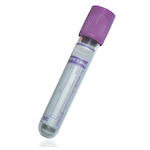Sirolimus (aka Rapamycin or Rapamune)
Specimen Volume
1 mL whole blood (minimum sample volume 600 uL)Sample Preparation
Turnaround Time
2 Working DaysSample Processing In Laboratory
Daily (Monday to Friday)Sample Stability
8 days at 4ºCGeneral Information
Sirolimus is an immunosuppressive agent. Isolated from Streptomyces hygroscopicus, Sirolimus is a macrocyclic lactone. It has a novel mode of action which does not involve inhibition of calcineurin. Interest in Sirolimus as an immunosuppressant in renal transplantation results, in part, from its novel mechanism of action and its distinct side effect profile.
Sirolimus has been demonstrated to be effective when used in a regimen with cyclosporine elimination. In clinical trials, higher serum creatinine levels and lower glomerular filtration rates were seen in patients treated with Sirolimus, cyclosporine, and corticosteroids compared to cyclosporine, corticosteroids, and either azathioprine or placebotreated controls. In contrast, a regimen with Sirolimus as base therapy, which eliminates cyclosporine by the end of month 3, results in significant improvement in graft function and a reduction in systolic and diastolic blood pressures. Sirolimus may be continued as maintenance therapy with corticosteroids only if cyclosporine can be progressively discontinued.
Patient Preparation
Trough sample required.
Reference Range
Reference or therapeutic ranges are not reported as therapeutic target ranges are applied on an individual basis dependent upon specialty, dosing, period in treatment regime and clinical status. Further advice can be obtained from the appropriate speciality.
Specifications
- EQA Status: NEQAS
- EQAS Scheme: Yes








